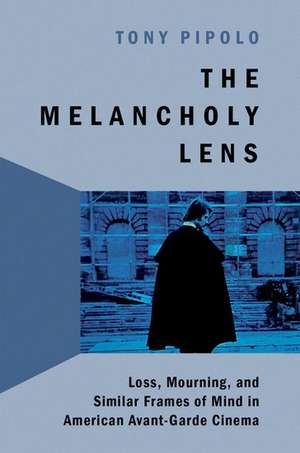The Melancholy Lens: Loss and Mourning in American Avant-Garde Cinema
Autor Tony Pipoloen Limba Engleză Paperback – 30 sep 2021
Preț: 226.53 lei
Preț vechi: 243.02 lei
-7% Nou
Puncte Express: 340
Preț estimativ în valută:
43.35€ • 45.20$ • 36.03£
43.35€ • 45.20$ • 36.03£
Carte disponibilă
Livrare economică 17-22 februarie
Preluare comenzi: 021 569.72.76
Specificații
ISBN-13: 9780197551172
ISBN-10: 0197551173
Pagini: 216
Ilustrații: 34 Film Stills
Dimensiuni: 231 x 155 x 15 mm
Greutate: 0.27 kg
Editura: Oxford University Press
Colecția OUP USA
Locul publicării:New York, United States
ISBN-10: 0197551173
Pagini: 216
Ilustrații: 34 Film Stills
Dimensiuni: 231 x 155 x 15 mm
Greutate: 0.27 kg
Editura: Oxford University Press
Colecția OUP USA
Locul publicării:New York, United States
Recenzii
The Melancholy Lens is that rare critical work which, through its emotional and imaginative parameters, transcends its critical denomination to become, itself, a work of art.
Employs psychoanalysis to explore the works of five avant-garde filmmakers through moments of loss and melancholy in their personal lives ... Through incisive analysis that never overreaches, Pipolo adds significantly to understanding these five filmmakers and their work.
Avowedly speculative, Pipolo's psychoanalytical approach nevertheless yields valuable insights, thanks to the confessional nature of the cinema in question and to the author's almost forensic attention to detail and his careful research ... This important book presents key works of experimental American cinema in a compelling new light.
This wonderfully written book is an exploration of the hearts and motivations of five film artists through their films, a study of loss and melancholy. Pipolo examines the filmmaker through the lens of the film to see what brought this particular film into existence. Informed by some knowledge of each filmmaker's life, by his own lifetime of looking lovingly at films, informed also by a scholarly but vital understanding of psychoanalysis, including a look at his own personal melancholy, he shows it all to us in his clear and careful writing style, shows why this artist had to make this film in this particular way. It seems there is some truth in the saying that loss makes an artist, or, as Stan Brakhage used to say, often, 'You must suffer to be great!'
Pipolo illuminates what is most exhilarating and troubling in films he feels as passionately about as do the most dedicated viewers of American avant-garde film.
Employs psychoanalysis to explore the works of five avant-garde filmmakers through moments of loss and melancholy in their personal lives ... Through incisive analysis that never overreaches, Pipolo adds significantly to understanding these five filmmakers and their work.
Avowedly speculative, Pipolo's psychoanalytical approach nevertheless yields valuable insights, thanks to the confessional nature of the cinema in question and to the author's almost forensic attention to detail and his careful research ... This important book presents key works of experimental American cinema in a compelling new light.
This wonderfully written book is an exploration of the hearts and motivations of five film artists through their films, a study of loss and melancholy. Pipolo examines the filmmaker through the lens of the film to see what brought this particular film into existence. Informed by some knowledge of each filmmaker's life, by his own lifetime of looking lovingly at films, informed also by a scholarly but vital understanding of psychoanalysis, including a look at his own personal melancholy, he shows it all to us in his clear and careful writing style, shows why this artist had to make this film in this particular way. It seems there is some truth in the saying that loss makes an artist, or, as Stan Brakhage used to say, often, 'You must suffer to be great!'
Pipolo illuminates what is most exhilarating and troubling in films he feels as passionately about as do the most dedicated viewers of American avant-garde film.
Notă biografică
Tony Pipolo is Professor Emeritus of Film and Literature at CUNY, New York. He is also a psychoanalyst in private practice and writes frequently on film for various journals and magazines.
